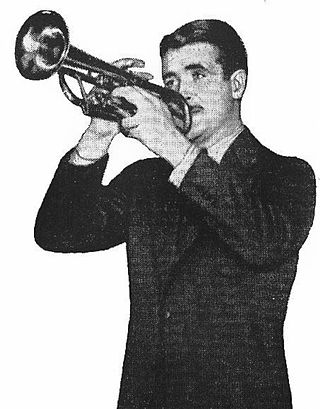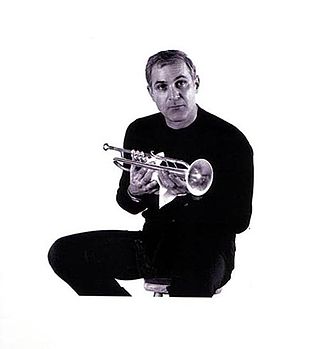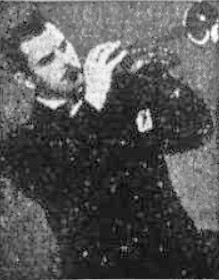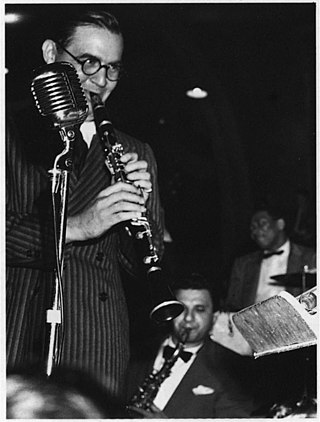Related Research Articles

Roland Bernard "Bunny" Berigan was an American jazz trumpeter and bandleader who rose to fame during the swing era. His career and influence were shortened by alcoholism, and ended with his early demise at the age of 33 from cirrhosis. Although he composed some jazz instrumentals such as "Chicken and Waffles" and "Blues", Berigan was best known for his virtuoso jazz trumpeting. His 1937 classic recording "I Can't Get Started" was inducted into the Grammy Hall of Fame in 1975.
The swing era was the period (1933–1947) when big band swing music was the most popular music in the United States. Though this was its most popular period, the music had actually been around since the late 1920s and early 1930s, being played by black bands led by such artists as Duke Ellington, Jimmie Lunceford, Bennie Moten, Cab Calloway, Earl Hines, and Fletcher Henderson, and white bands from the 1920s led by the likes of Jean Goldkette, Russ Morgan and Isham Jones. An early milestone in the era was from "the King of Swing" Benny Goodman's performance at the Palomar Ballroom in Los Angeles on August 21, 1935, bringing the music to the rest of the country. The 1930s also became the era of other great soloists: the tenor saxophonists Coleman Hawkins, Ben Webster and Lester Young; the alto saxophonists Benny Carter and Johnny Hodges; the drummers Chick Webb, Gene Krupa, Jo Jones and Sid Catlett; the pianists Fats Waller and Teddy Wilson; the trumpeters Louis Armstrong, Roy Eldridge, Bunny Berigan, and Rex Stewart.

The Dorsey Brothers were an American studio dance band, led by Tommy and Jimmy Dorsey. They started recording in 1928 for OKeh Records.

Charles James Shavers was an American jazz trumpeter who played with Dizzy Gillespie, Nat King Cole, Roy Eldridge, Johnny Dodds, Jimmie Noone, Sidney Bechet, Midge Williams, Tommy Dorsey, and Billie Holiday. He was also an arranger and composer, and one of his compositions, "Undecided", is a jazz standard.

Frederic Efrem Rich was a Polish-born American bandleader and composer who was active from the 1920s to the 1950s. Among the musicians in his band were the Dorsey Brothers, Joe Venuti, Bunny Berigan, and Benny Goodman. In the early 1930s, Elmer Feldkamp was one of his vocalists.
Franklin "Lin" Biviano is an American jazz trumpeter best known for his powerful lead trumpet playing with Buddy Rich, Count Basie, and Maynard Ferguson. He has also played and recorded with Hoagy Carmichael, Jo Ann Castle, Bill Chase, Buddy DeFranco, Jimmy Dorsey, Ella Fitzgerald, Woody Herman, Milt Jackson, Harry James, Stan Kenton, Glenn Miller, Frank Sinatra, Steve Smith, Mel Tormé, Sarah Vaughan, Fats Waller, and Lawrence Welk, mostly playing lead trumpet. From 1974-1976 he led his own big band; they toured the East Coast and recorded the single L.A. Expression with Love Is Stronger Far Than We on the flipside. From 1964-1965, he attended Berklee School of Music, and in 2002 he was asked to return as a teacher; as of 2017 he is still on the faculty, teaching mainly ensembles and private lessons.

Pete Candoli was an American jazz trumpeter. He played with the big bands of Woody Herman and Stan Kenton and worked in the studios of the recording and television industries.

Roy Stevens (1916–1988) was an American trumpet player, Stevens-Costello System brass embouchure teacher, and author of the Embouchure Self-Analysis: Stevens-Costello Triple C Embouchure Technique with Bill Moriarity.

Vido William Musso was an American jazz saxophonist.
"I Can't Get Started", also known as "I Can't Get Started with You" or "I Can't Get Started (with You)", is a popular song. It was written in 1936 by Vernon Duke (music) and Ira Gershwin (lyrics) and introduced that year in the revue Ziegfeld Follies of 1936, where it was performed by Bob Hope and Eve Arden.

A big band remote was a remote broadcast, common on radio during the 1930s and 1940s, involving a coast-to-coast live transmission of a big band.
Al Porcino was an American lead trumpeter.
The Metronome All-Stars were a collection of jazz musicians assembled for studio recordings by Metronome Magazine, based on its readers' polls. The studio sessions were held in the years 1939–42, 1946–53, and 1956, and typically consisted of two tracks which allowed each participant a chance to solo for one chorus. Earlier recordings feature more swing style, while the later sessions tend more toward bebop.

George "Pee Wee" Erwin was an American jazz trumpeter.
Joe Dixon was an American jazz reed player.
Chronological Classics was a French compact disc reissue label. Gilles Pétard, the original owner, intended to release the complete master takes of all jazz and swing recordings that were issued on 78 rpm. By the time the label suspended operations in July 2008, its scope had extended to LPs.

This is a timeline documenting events of Jazz in the year 1947.
Raymond Harry "Ray" Brown is an American composer, arranger, trumpet player, and jazz educator. He has performed as trumpet player and arranged music for Stan Kenton, Bill Watrous, Bill Berry, Frank Capp – Nat Pierce, and the Full Faith and Credit Big Band.
Bernard Privin was an American jazz trumpeter.
References
- ↑ Name Dropper or "People I've Schlepped With", by Morris I. Diamond, BearManor Media (publisher) (2011); ISBN 1593936532; ISBN 9781593936532
- ↑ Beverly Hill Records biography of Morris I. Diamond
- ↑ "Vet Gained Friends, Lost Hearing in War" (bio), by Denise Goolsby, The Desert Sun, December 7, 2010
- ↑ "Biography of Willie Bobo", by James Nadal, www.allmusic.com, Rovi Corporation
- ↑ "Horizontal Slide 2" Archived 2014-09-03 at the Wayback Machine , website of Fred Charap
- ↑ The jazz of the Southwest: an Oral History of Western Swing, by Jean Ann Boyd, University of Texas Press (1998), pg. 58; ISBN 0292708599; ISBN 9780292708594; ISBN 0292708602; ISBN 9780292708600
- ↑ Bunny Berigan: Elusive Legend of Jazz, by Robert Dupius (born 1926), Louisiana State University Press (1933), pg. 177; OCLC 22662815 ISBN 0807116483 ISBN 9780807116487
- ↑ "Bunny Berigan – Mr. Trumpet: The Golden Boy Moves," by Michael Paul Zirpolo, Jr. (born 1950), IAJRC Journal , June 1, 2010; ISSN 0098-9487
- ↑ Mr. Trumpet: The Trials, Tribulations, and Triumph of Bunny Berigan, by Michael Paul Zirpolo, Jr. (born 1950), Scarecrow Press (1911) ISBN 0810881527 ISBN 978-0810881525
- ↑ "As Written," Billboard , pg. 19, col. 1, March 22, 1947